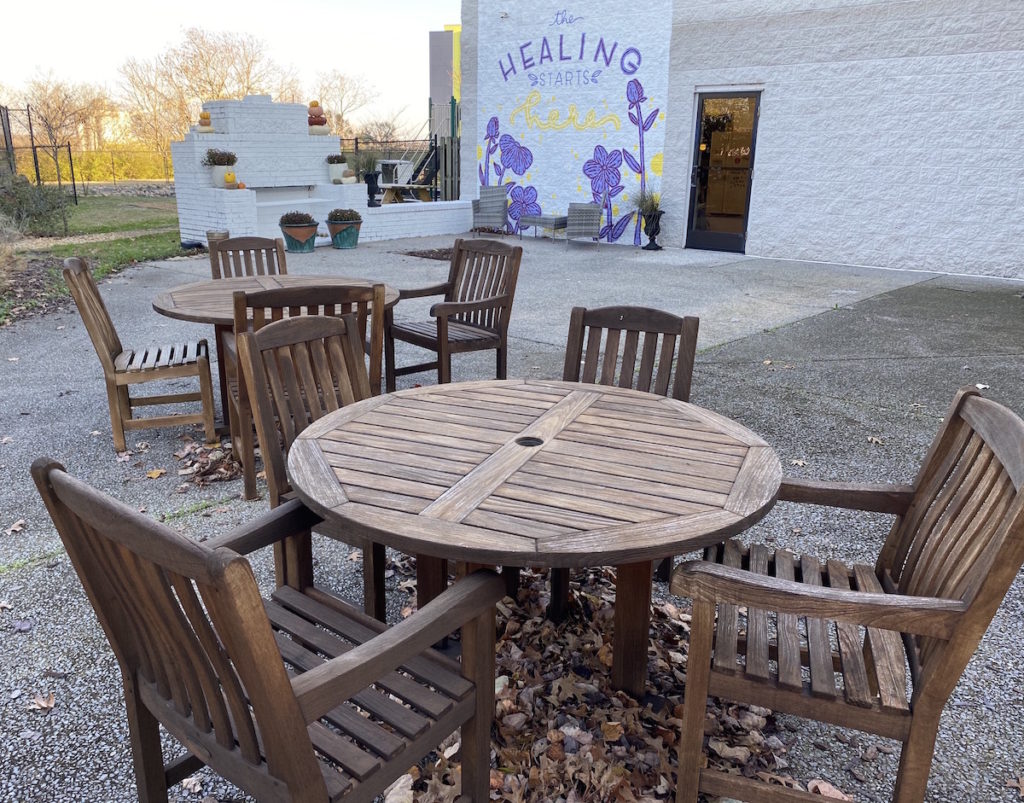
This story is part of the series “Surging in Silence” by WPLN News contributor Natasha Senjanovic and is produced in partnership with the Pulitzer Center. It examines the effects of domestic and sexual violence in the pandemic in Memphis and Nashville.
Despite shelters in place and social distancing, Nashville’s Sexual Assault Center is seeing more clients than ever during the pandemic.
Some are seeking help for recent assaults, others for past traumas.
So the center has had to find innovative ways to meet demand, and reach populations who are particularly vulnerable, beginning with how to offer one of their most in-demand services: therapy.
These days, it’s mostly remote. Not everyone has the technology or desire for that, but they may not want to enter the building, even with all the safety measures.
For those clients, there’s a new option, says Rachel Freeman, the center’s president.
“We’ve started just calling this whole space a healing garden,” she says, standing to the side of the building. Behind her is a large, white mural with purple flowers and the words, “Healing starts here.”
There’s a brick patio, a playground, a basketball net. There’s even a sand labyrinth and brightly colored pinwheel sculptures. A fountain runs when the weather is nice.
Nearby, there are several new wooden tables, large enough for a distanced therapy session. The area is fenced in for safety. And despite a steady flow of traffic below, Freeman says being out there helps clients and counselors.
“It feels very confidential when you’re up here. It’s a peaceful way to do this very difficult work,” she says.
Extending the center’s reach
The pandemic has been devastating for victims of sexual crime and trauma, says Freeman. It simultaneously creates so many problems and barriers to getting help for them. Yet, she says there have also been some “unique positives” to come out of the past 11 months.
Outdoor therapy is one. Even more important to Freeman was becoming more culturally competent and inclusive for African American, LGBTQ and Hispanic victims.
“It’s really easy to say we serve everybody and sexual assault knows no boundaries, and we want to make sure that anybody who needs us can feel comfortable coming in to our doors,” says Freeman, but the center can’t be a safe place for those who don’t know it exists.
So in July, they created three outreach teams and expanded their services through other community organizations, including the Hispanic Family Foundation. That led to an influx of Latinx clients, and the hiring of a third Spanish-speaking therapist, Bianca Ho.
Ho says most of her clients are essential workers, who “have to leave their home and they have to work, because they’re a double income home.” That makes Latinx populations particularly vulnerable to COVID, and the anxiety it brings.
With remote therapy, Ho can come to them, which is particularly convenient for clients who have kids or don’t have transportation.
Therapists have long been pushing for telehealth, but it took the pandemic to make it available, virtually overnight. Which meant the center’s COVID-related expenses included laptops for all its therapists.
It’s taken some adjusting, says Ho, especially for children.
“They have online school all day long and then they have therapy in the afternoon sometimes,” she says, which leads to “Zoom fatigue.”
Still, teletherapy is a lifeline right now, and some even find it easier to open up through a screen or over the phone, says Freeman. She also calls it “one of the silver linings that we hang on to post-pandemic.”
Reducing a long waitlist
Another is a new first-response therapist they hired in the fall.
Annually, the center offers counseling — along with medical and advocacy services — to some 1,200 child and adult survivors, and their families. Many come years after an assault, and the wait time for therapy can be months long.
But as the pandemic progresses, Freeman says they’re seeing twice as many such clients, often in acute crisis.
“If a sexual assault survivor is living through another very stressful situation, the trauma history often resurfaces and becomes more difficult to deal with,” she says.
That’s where the first-response therapist comes in. By offering interim crisis care to individuals and groups, the center’s waiting list for long-term therapy has been cut by a third.
Yet not everyone is seeing positive changes. The nurse practitioners who perform forensic rape exams in Nashville, including at the Sexual Assault Center, are still averaging a patient a day — half of whom come from surrounding counties for lack of anywhere else to go.
There’s only one difference that Pam Crues has noticed. She heads SANE (Sexual Assault Nurse Examiners), the team based out of Nashville General Hospital that conducts rape kits at four locations in Nashville.
Since COVID started, says Crues, “the overwhelming majority of victims I have personally seen this past year know their assailant. It’s a friend. It’s a friend of a friend. It’s [a] spouse.”
So-called “stranger rapes” usually comprise 20% of all assaults and may follow encounters at bars or parties. Yet, while those social interactions have dropped significantly, the stress of the pandemic only grows. And abusive people tend to react to high stress with more violence against those closest to them, says Freeman.
Which is why she and her colleagues are bracing for a surge. Not just in sexual assaults, but in all the emotional fallout those crimes and traumas bring.
She says they’ll keep finding new ways — and hopefully new funding — to meet those needs.
“This pandemic is going to have a long-term, negative impact on the lives of victims and survivors of sexual abuse,” says Freeman, “that we can’t even wrap our minds around at this point in time.”
If you or someone you know needs help, please call the Sexual Assault Center’s 24-hour support line, at 866-811-7473.

